In modern tourism, data has become the driving force behind competitiveness and decision-making in destinations. From trip planning to post-stay experiences, every digital interaction generates information that can transform strategic decisions: adjusting hotel offerings, optimizing transport routes, anticipating demand, or measuring visitor satisfaction.
Data management in tourism as a strategic axis
Data governance in tourism is not just a technological issue; it involves processes, policies, roles, and strategies to turn data into tangible value for destinations, businesses, and tourists. Furthermore, digitalization allows information to flow quickly between public and private stakeholders, facilitating immediate responses to critical situations such as destination overcrowding, unforeseen events, or demand changes.
Although exact figures for the total volume of data generated solely by tourism are not available, we can put it into context:
In 2025, Statista estimates that the global volume of data created, captured, copied, and consumed will reach approximately 181 trillion GB. Meanwhile, IATA forecasts about 5 billion air passengers that same year, meaning a substantial portion of this ocean of information will be tourism-related: bookings and check-ins, social media reviews, itineraries, signals from sensors in destinations and cities, and data generated by mobile apps for transport and experiences.
The sector’s challenge is to leverage this massive data to improve the tourist experience, manage destination capacity, and increase sustainability without violating privacy. Each city and tourist destination may have a different data generation pattern, depending on visitor volume, technological infrastructure, and adoption of mobile apps and digital platforms.
Challenges and strategies for good data governance in the tourism sector

Tourism data management faces complex challenges due to the diversity of sources such as booking platforms, transport apps, and social media, which generate data in various formats. This heterogeneity requires tools capable of integrating and analyzing data in real time to optimize smart destination management.
Additionally, interoperability between public and private actors and compliance with regulations like GDPR are key to ensuring efficient and lawful data governance. Overcoming these challenges is essential to improving the tourist experience, optimizing resources, and strengthening the digital reputation of destinations.
Specific challenges in tourism data management
- Managing multiple sources of information.
- Handling large volumes of data.
- Collaborating between public and private actors.
- Ensuring regulatory compliance.
The management of data in the tourism sector faces multiple challenges, mainly due to the wide variety of information sources, the need to process enormous volumes of data in real time, and the obligation to comply with increasingly strict legal regulations. Data sources vary greatly, from hotel management systems to mobility sensors and social networks, adding complexity to the process. The main challenges faced by tourism companies and destinations are:
Diverse data sources
Data comes from PMS, CRS, OTAs, transport apps, mobility sensors, capacity cameras, energy and water systems, and social media. Each source has different structures and formats: structured, semi-structured, and unstructured data. This heterogeneity requires tools capable of cleaning, normalizing, and correlating information to obtain useful insights.
Growing data volume - Big Data in tourism
Smart cities and destinations need infrastructure capable of processing data in real time: detecting overcrowding on beaches, measuring visitor flows at events, or automatically adjusting hotel offers. Predictive analytics also allow anticipating demand changes based on seasonality, special events, or even weather conditions, optimizing resources and improving visitor experience.
Interoperability
For strategic decision-making, public bodies, private companies, and tech platforms must share data with common standards, ensuring traceability and consistency. Interoperability also facilitates integrating payment, booking, and mobility systems, as well as collecting sustainability and environmental footprint metrics.
Regulatory compliance
GDPR and LOPDGDD regulate tourists' privacy and data processing. Data minimization, explicit consent, and impact assessments (DPIA) are fundamental to operate without legal risks. Moreover, good data governance builds tourist trust and strengthens the digital reputation of destinations.
Effective strategies for data management in the tourism industry
- Setting precise goals.
- Choosing KPIs that drive decisions.
- Opting for flexible architectures.
- Promoting public-private sector synergy.

To achieve efficient management of tourism information, it is necessary to adopt strategies for data management in the tourism industry that enable optimal use of available information, ensuring resources are effectively employed to meet destination goals. This approach should be based on:
Defining clear objectives
For example: optimizing tourist flows to avoid congestion, increasing average tourist spending, improving sustainability and reducing environmental impact, or monitoring the destination's online reputation. Clear objectives allow prioritizing indicators and technological resources efficiently.
Selecting metrics that encourage decision-making
Beyond data quantity, it is vital to measure KPIs that drive informed decisions: hotel occupancy, average length of stay, satisfaction index, carbon footprint, and mobility patterns. Advanced analytics can combine these indicators with external data, such as transport prices or weather information, to forecast demand changes and adjust offers.
Designing flexible and scalable architectures
Infrastructure must adapt to new data sources and seasonal demand peaks, integrating cloud solutions and analytical platforms that allow scaling storage and processing. This includes storing historical data for longitudinal analysis and simulating future scenarios through predictive models.
Coordinating public and private actors
Effective tourism data management requires coordinated work among public actors (municipalities, councils, ministries, port and airport authorities) and private ones (hotels, transport, travel agencies, retailers, etc.), with clear roles defined. Three profiles are identified: data owner (who generates it), custodian (responsible for security and compliance), and authorized user (who makes decisions based on data). This structure facilitates planning, activates early warnings, and ensures rapid responses to emergencies or mass events, improving safety and management in tourist destinations.
An example of collaboration would be integrating public transport mobility data with hotel occupancy information, allowing public and private managers to coordinate visitor flows and activate real-time alerts to optimize responses to potential crowds or emergencies.
Benefits for tourism sector companies
Proper data governance not only helps overcome the aforementioned challenges but also brings strategic benefits that boost sustainability, improve visitor experience, and optimize the performance of companies and tourist destinations. Some main benefits derived from efficient data governance are:
|
Benefits of effective data management in tourism
|
|
Improved decision making
|
Enables informed decisions through real-time data analysis, optimizing resources and operational efficiency.
|
|
Optimization of visitor experience
|
Facilitates managing tourist flows, avoiding overcrowding, and improving satisfaction through personalized offers.
|
|
Increased operational efficiency
|
Enhances resource allocation and operational scheduling, reducing costs and improving destination profitability.
|
|
Strengthened digital reputation
|
Transparency in data management and compliance with regulations increases tourist trust and loyalty.
|
|
Promotion of innovation and sustainability
|
Drives the use of innovative technologies for tourism management, improving sustainability and reducing environmental impact.
|
|
Regulatory compliance and privacy protection
|
Ensures respect for privacy and data protection laws, avoiding legal risks and increasing tourist confidence.
|
Key technologies for data governance in tourism

Smart tourism relies not only on advanced technologies to improve traveler experience but also on solid data governance. This involves an integrated ecosystem combining data storage, analysis, and visualization with clear management, security, and privacy policies. Data governance in tourism ensures that information generated by booking platforms, mobility, sensors, and social networks is managed ethically, securely, and efficiently. By establishing clear roles and responsibilities, it enables more informed and precise decision-making, optimizing destination management, service personalization, and sector sustainability.
Cloud Data Lakehouse
Solutions like Microsoft Fabric or Azure Synapse integrate structured data (bookings, payments, sales) and unstructured data (reviews, photos, sensor data) in a single platform, facilitating exploration of large volumes and real-time insights generation.
Integration of sources via APIs and connectors
Connecting PMS, OTAs, mobility apps, IoT sensors, and sustainability systems allows continuous information flow, enabling comprehensive analysis and coordination.
Zero Trust Security
Tools like Microsoft Entra ID offer access control, multi-factor authentication, and data encryption, protecting tourist information and ensuring regulatory compliance.
Data governance and cataloging
Platforms like Microsoft Purview enable asset cataloging, data lineage management, classification, and applying protection policies, ensuring ethical use and regulatory compliance.
Visualization and advanced analytics
Power BI in tourism, combined with AI and machine learning, enables interactive dashboards and demand predictions, visitor flows, destination saturation, and average visitor spending, turning data into strategic decisions.
Data governance in tourism is central to making the sector smarter, more sustainable, and competitive. Integrating technologies like Microsoft Azure, Fabric, and Power BI, alongside good governance practices and regulatory compliance, allows tourist destinations to turn massive data into strategic decisions that enhance visitor experience and sector efficiency. Contact us! We will advise you with the best governance strategy for your business.